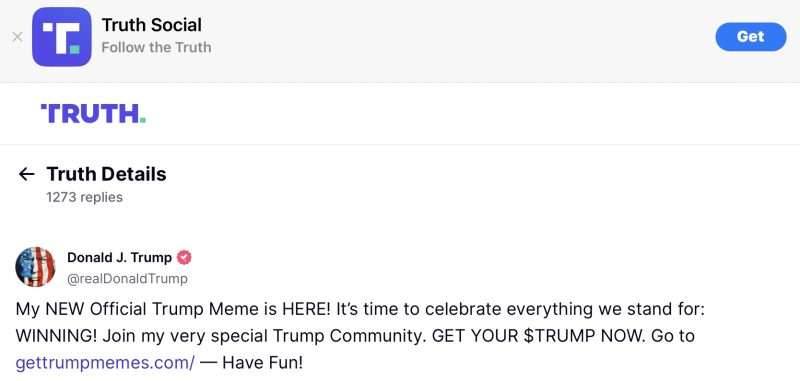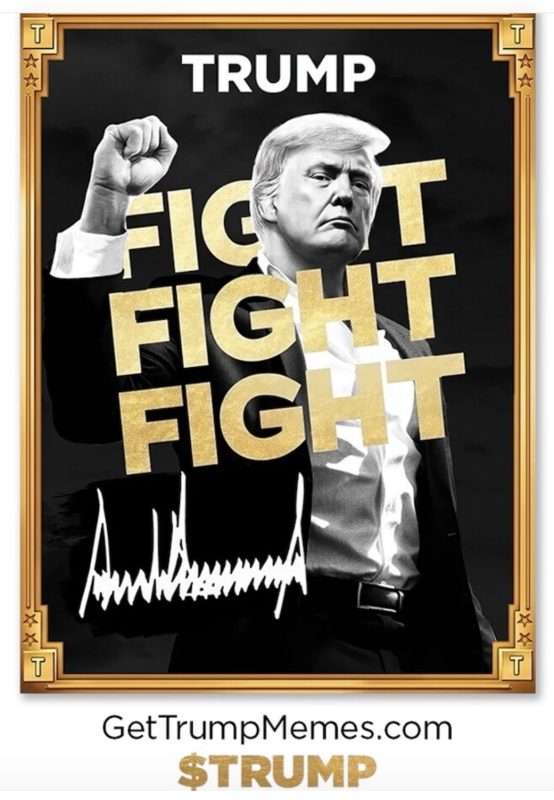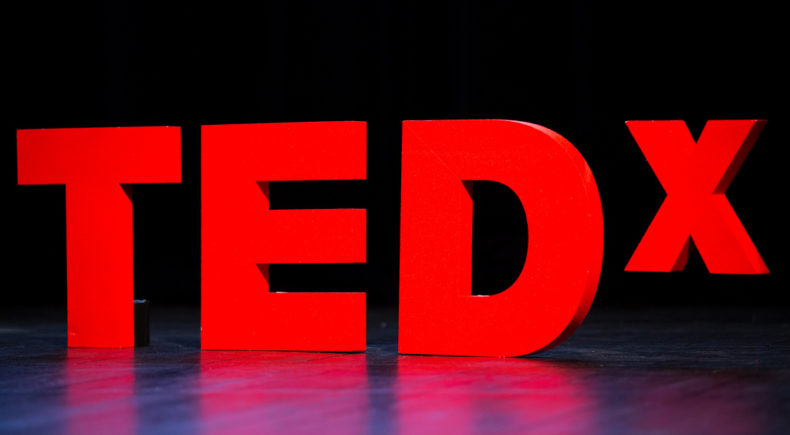Donald Trump, US President-elect, has just announced on Truth Social, his social media platform, a new $Trump token.

Here’s the artwork that came with the announcement.

So just what is the $Trump token?
The $TRUMP token is a cryptocurrency launched by President-elect Donald Trump on January 17, 2025, just days before his inauguration. Hosted on the Solana blockchain, $TRUMP is categorized as a meme coin, reflecting its symbolic nature rather than functional utility. 
Key Details:
• Supply and Ownership: The total supply of $TRUMP is capped at 1 billion tokens. At launch, 200 million tokens were made available, with the remaining 800 million to be released over the next three years. Notably, 80% of the total supply is owned by CIC Digital LLC and Fight Fight Fight LLC, entities affiliated with the Trump Organization. These holdings are subject to a three-year release schedule. 
• Market Performance: Following its announcement, $TRUMP experienced a significant surge in value. Initially priced at $0.18, the token’s value peaked at $33.78, resulting in a market capitalization of approximately $6 billion. The fully diluted valuation, considering the total supply, reached $30 billion. 
• Purpose and Disclaimer: According to the official website, $TRUMP is intended as a symbol of support for President-elect Trump’s ideals and is not designed as an investment opportunity or security. A disclaimer emphasizes that the token is “not political and has nothing to do with any political campaign, political office, or government agency.” 
Controversies and Concerns:
The launch of $TRUMP has sparked discussions regarding potential conflicts of interest, given the significant insider ownership and the timing close to the inauguration. Ethics experts have raised concerns about the intertwining of personal business ventures with public office responsibilities. Former White House Communications Director Anthony Scaramucci described the move as “Idi Amin level corruption,” highlighting apprehensions within the cryptocurrency community.
For more on the ethical concerns look here. 
In summary, the $TRUMP token represents President-elect Donald Trump’s entry into the cryptocurrency market, embodying his support for digital assets. While it has garnered substantial attention and market activity, it also raises important ethical considerations regarding the intersection of personal business interests and public service.
For those of you who’d like to know more about cryptocurrencies and crypto markets, we hope this helps.
What is Cryptocurrency?
Cryptocurrency is a type of digital money. Unlike traditional money (like dollars or euros), it doesn’t exist as physical coins or bills. It’s entirely online and relies on blockchain technology to keep things secure and decentralized.
• Blockchain: Think of it as a digital ledger or record book that everyone can see. It keeps track of all transactions in a transparent and secure way.
• Decentralization: Unlike regular money controlled by banks or governments, cryptocurrencies are managed by a network of computers around the world.
Examples of cryptocurrencies:
• Bitcoin (the first and most popular cryptocurrency).
• Ethereum (which also powers “smart contracts” beyond just currency).
• Thousands of others like Litecoin, Solana, and Dogecoin.
How Do Cryptocurrencies Work?
1. Ownership:
When you buy cryptocurrency, you own a digital asset. Ownership is tracked using a private key (a secret code). Losing this key is like losing the only key to a safe; you can’t get your crypto back.
2. Transactions:
You can send or receive cryptocurrency. Every transaction is recorded on the blockchain, so everyone knows it happened, but your identity remains anonymous.
3. Mining/Validation:
For most cryptocurrencies, transactions are verified by a process called mining or validation (depending on the specific type of crypto). This process involves solving complex mathematical problems, and successful miners are rewarded with new cryptocurrency.
What is a Crypto Market?
The crypto market is where cryptocurrencies are bought, sold, and traded. It works similarly to a stock market but focuses on cryptocurrencies instead of company shares.
• Crypto Exchanges: Platforms like Coinbase, Binance, and Kraken are online marketplaces where people trade cryptocurrencies.
• Supply and Demand: Prices in the crypto market are determined by how many people want to buy or sell a specific cryptocurrency. If lots of people want it, the price goes up. If fewer people are interested, the price drops.
What Makes Crypto Markets Unique?
1. 24/7 Trading:
Crypto markets never close. You can trade any time, day or night.
2. Volatility:
Prices can change dramatically in minutes. This makes crypto exciting for some and risky for others.
3. No Central Authority:
Unlike traditional markets, there’s no government or central bank controlling crypto markets.
4. Global Access:
Anyone with internet access can participate, no matter where they are.
Why Do People Use Cryptocurrencies?
1. Investing: Many people buy crypto hoping its value will rise over time.
2. Fast Payments: Transactions can be quicker and cheaper than traditional bank transfers, especially across borders.
3. Decentralization: Some prefer it because it’s not controlled by banks or governments.
4. New Applications: Crypto powers things like NFTs (digital art) and decentralized apps (dApps).
Risks and Things to Be Careful About
1. Volatility: Prices can drop as fast as they rise. You could lose money.
2. Security: If you lose your private key or fall for scams, your crypto is gone forever.
3. Lack of Regulation: Without oversight, some exchanges and projects can be unreliable or fraudulent.
To summarise, cryptocurrencies are digital money that operate on a technology called blockchain. They can be traded on markets similar to stocks, but they are highly volatile and operate 24/7. They offer exciting possibilities but come with risks that every newcomer should understand before diving in!
How Are Tokens Like $Trump Created?
Tokens like $Trump are usually built on existing blockchain platforms that allow users to create their own cryptocurrencies. Here’s how the process works:
Building the Token
• Blockchain Platforms:
Popular platforms like Ethereum, Binance Smart Chain (BSC), or Polygon enable token creation using their existing infrastructure. These blockchains use smart contracts to define and manage the token’s behavior.
• Example: An Ethereum-based token might follow the ERC-20 standard, which provides a blueprint for creating tokens.
• Smart Contracts:
A smart contract is essentially a piece of code that defines the token’s rules, such as:
• Total supply (how many tokens exist).
• Decimals (fractional units).
• Ownership rights.
• Special features (e.g., transaction fees or rewards).
• Cost of Creation:
Creating a basic token is relatively inexpensive, especially on blockchains with lower transaction fees (e.g., Binance Smart Chain). Developers with coding skills can launch a token for as little as a few hundred dollars.
Customization Options
• Name & Symbol: Branding is critical for meme or personality-based tokens. Names like $Trump or $DOGE are designed to be recognizable and memorable.
• Deflationary Mechanisms: Some tokens burn a portion of each transaction, reducing supply over time to increase scarcity.
• Tokenomics: The creator decides how tokens will be distributed:
• A portion might go to the creator.
• Some could be reserved for marketing or giveaways.
• The rest might be sold to the public.
How Are These Tokens Promoted?
Tokens like $Trump rely heavily on marketing and community-building for success. Here are common strategies:
Social Media Campaigns
• Platforms like Twitter, Telegram, Reddit, and Discord are used to spread awareness. Creators often post memes, announcements, and promises of future growth.
• Influencers or celebrities might be paid to endorse the token, which boosts its visibility.
Fan/Political Engagement
• Tokens tied to public figures or causes tap into existing fanbases or political movements.
• Example: $Trump may target Trump supporters, framing it as a way to “own the libs” or participate in a Trump-centric financial ecosystem.
Community Hype
• Communities are built around the token to create a sense of belonging. These communities encourage members to “HODL” (hold onto their tokens) and recruit new investors.
“Use Cases” and Roadmaps
• Promoters often create roadmaps that outline future plans, such as:
• Building an app or marketplace that uses the token.
• Integrating the token into games or NFTs.
• Claiming political or social causes tied to the token’s success.
How Do They Gain Value?
A token’s value depends on perception, demand, and supply. Here’s how it typically plays out:
Hype and FOMO
• Early adopters hype the token, creating Fear of Missing Out (FOMO) among potential investors. As more people buy in, the price rises.
Limited Supply
• Many tokens are designed with a capped supply, meaning only a certain number will ever exist. Scarcity can drive up demand.
Speculation
• Buyers may treat the token as a speculative investment, hoping its value will rise over time.
Potential Use Cases
• If the token is integrated into a larger ecosystem (like apps, games, or exclusive memberships), it may gain more long-term utility and value.
Risks of Meme/Personality Tokens
Pump-and-Dump Schemes
• Developers or insiders might artificially inflate the token’s price by generating hype, only to sell their holdings at the peak, leaving others with worthless tokens.
Lack of Utility
• Many personality or meme tokens lack real-world use cases. If hype dies down, there’s no intrinsic value to sustain the token.
Regulatory Risks
• Governments are increasingly scrutinizing cryptocurrencies. Tokens tied to public figures could face legal challenges, especially if they’re seen as scams or securities.
Reputation
• If the token’s figurehead (like Trump) becomes controversial or disassociates from the project, the token could lose its appeal.
Example: A (no longer) Hypothetical $Trump Token Strategy
Let’s say someone creates a $Trump token, as they now have, here’s how it might unfold:
1. Launch Phase:
• Deploy the token on a blockchain like Binance Smart Chain.
• Announce it as a symbol of support for Trump or his political ideology.
• Reserve a portion of tokens for developers and marketing.
2. Marketing Phase:
• Create buzz on Twitter and Telegram, targeting Trump supporters.
• Launch a website claiming that $Trump will be used for donations, merchandise, or exclusive access to Trump-related content.
3. Community-Building:
• Encourage holders to promote the token and recruit more buyers.
• Offer incentives like giveaways or airdrops (free tokens for holding or promoting).
4. Speculation and Hype:
• As demand grows, prices rise, creating a feedback loop where new buyers are drawn in by rising prices.
5. Reality Sets In:
• If the token lacks real utility or if the community loses interest, its value could plummet.
Final Thoughts
Tokens like $Trump represent a mix of creativity, speculation, and marketing. While they can be fun or profitable in the short term, they carry significant risks. Always approach such tokens with caution, do your research, and avoid investing money you can’t afford to lose.
As t9 the ethical situation of a President-elect launching such a token, well that will be a later topic of discussion.
* Created by Michael Barker, Editor, Fremantle Shipping News with the help of our AI assistant, Shippo.
~~~~~~~~~~~~~~~~~~~~~~~~~~~~~~~~~~~~~~~~
** If you’d like to COMMENT on this or any of our stories, don’t hesitate to email our Editor.
*** WHILE YOU’RE HERE –
PLEASE HELP US TO GROW FREMANTLE SHIPPING NEWS
FSN is a reader-supported, volunteer-assisted online magazine all about Fremantle. Thanks for helping to keep FSN keeping on!
**** Don’t forget to SUBSCRIBE to receive your free copy of The Weekly Edition of the Shipping News each Friday!
*****AND Shipees, here’s how to ORDER YOUR FSN MERCH. Fabulous Tees with great options!







